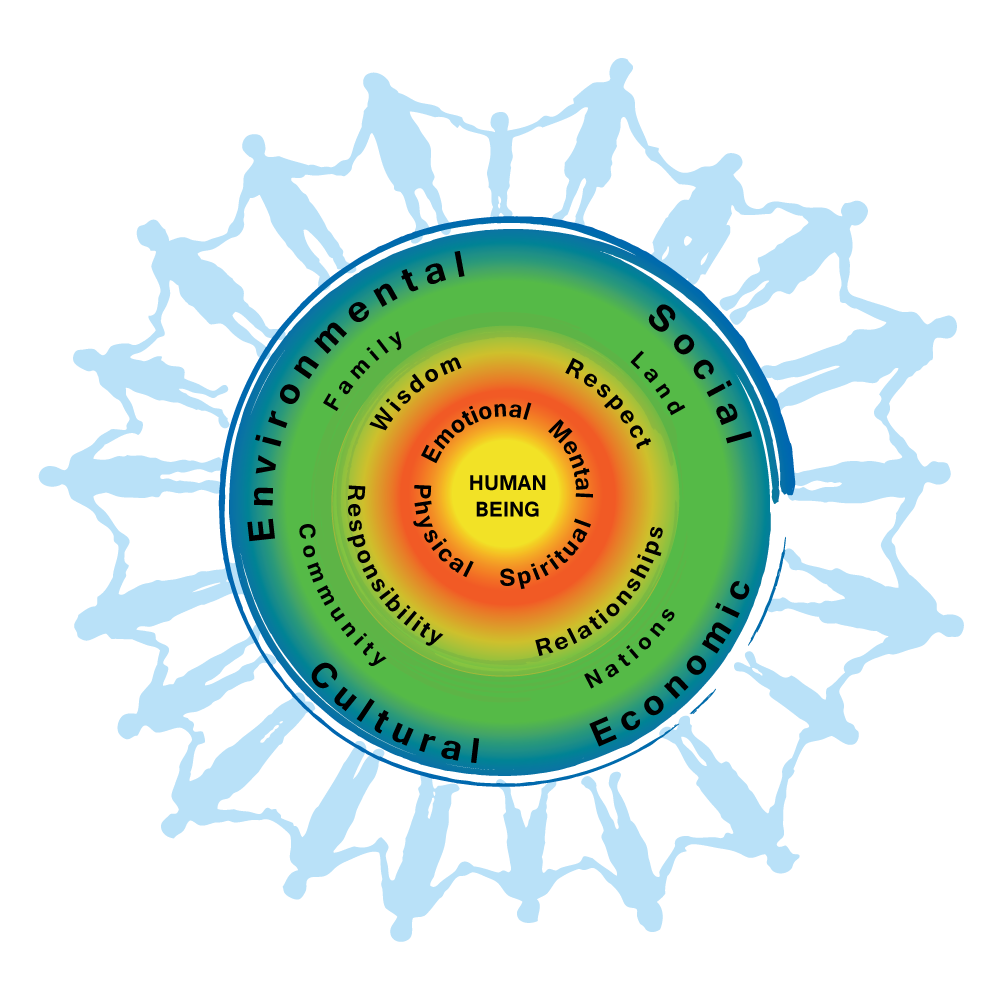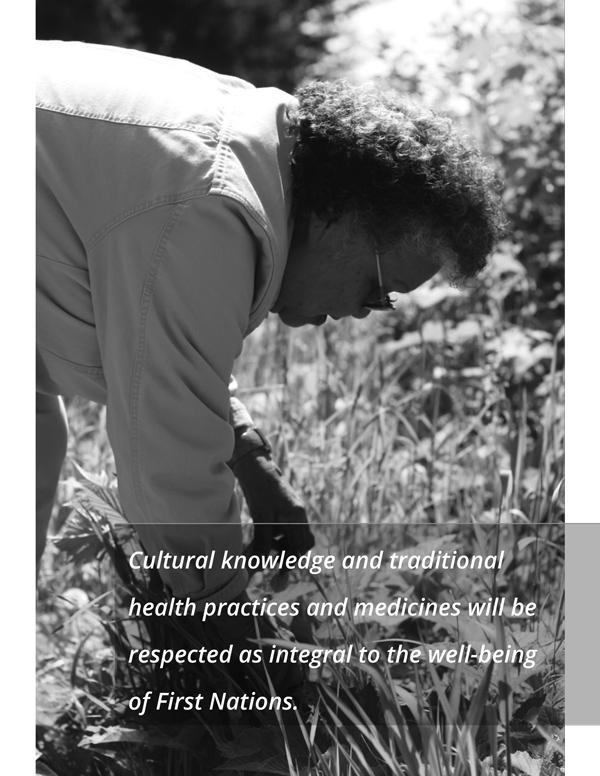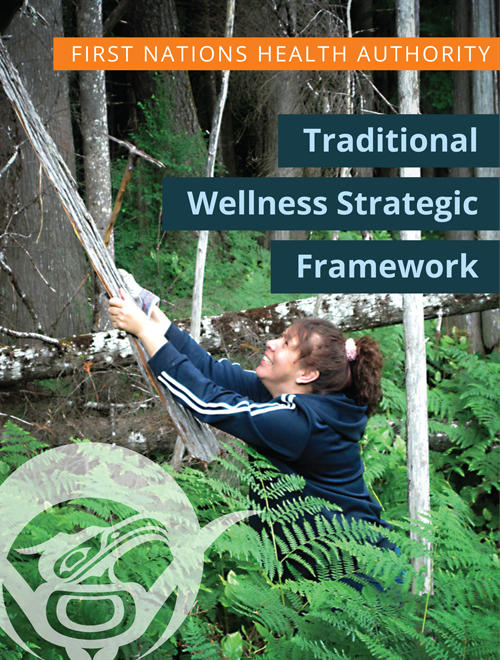The Traditional Wellness Vision is to improve the mental, emotional, spiritual and physical wellbeing of First Nations, while strengthening the traditional health care system through a partnership between traditional healer practitioners and the Western medical system.
What is Traditional Healing?
Traditional healing refers to health practices, approaches, knowledge and beliefs incorporating First Nations healing and wellness while using ceremonies; plant, animal or mineral-based medicines; energetic therapies; or physical/hands on techniques.
Why is Traditional Wellness Important?
First Nations in BC have practiced traditional healing and wellness since time immemorial. In partnership with First Nations, The First Nations Health Authority (FNHA) is embarking on a journey to position First Nations healing and wellness as central to health and wellness strategic planning and programming. As First Nations in BC lead efforts with both the provincial and federal governments in achieving health service transformative change, the acceptance of holistic approaches to health care will in effect enhance and strengthen the circle of care for First Nations in BC.
First Nations healing and wellness is a very important part of First Nations health that is often overlooked by the health care system. The importance of using First Nations healing and wellness is to improve the health of First Nations in BC by incorporating First Nations healing and wellness; preventing and treating of chronic conditions; and promoting health and wellness.
There are a number of studies and reports that suggest incorporating traditional healing and wellness into health services for First Nations will improve health and wellness. Holistic wellness is believed to lead to better long term results, not just for the health system but also for First Nations individuals, families, communities, and nations.
As First Nations assume responsibility for the management, design and delivery of community-based health and wellness services, First Nations have the space to incorporate practices and models that better meet the health and wellness perspective and priorities of the community. Therefore, it is a priority to support the incorporation of First Nations healing and wellness into health policies, programs and services and to do this in a way that is safe and relevant for First Nations in BC. The FNHA is committed to continuing the conversation with communities to understand what is working well and what needs to be improved. This ongoing dialogue will ensure First Nations perspectives and priorities inform the efforts to redesign programs and services and also inform the broader work to creating strategies and advancing health actions areas with our tripartite partners.

First Nations health and wellness is based on a holistic model of health, and is often overlooked in the prevention and treatment of chronic conditions and in the promotion of health and wellness. An integral focus of First Nations healing and wellness is through the balance and inter-relationships of the physical, mental, emotional, and spiritual aspects of a being. This relationship is discussed further in the First Nations Perspective on Health and Wellness.
To learn more about the First Nations Perspective on Health and Wellness please go to the following link http://www.fnha.ca/wellness/wellness-and-the-first-nations-health-authority/first-nations-perspective-on-wellness

External Links & Resources
1. World Health Organization
WHO is the directing and coordinating authority for health within the United Nations.
http://who.int/medicines/areas/traditional/en/
2. Prometra: The Association for the promotion of Traditional Medicines.
An international organization for the preservation and restoration of the ancient arts of traditional medicine
http://www.prometra.org
3. National Center for Complimentary and Integrative Health (NCCIH)
The National Center for Complementary and Integrative Health (NCCIH) is the Federal Government's lead agency for scientific research on the diverse medical and health care systems, practices, and products that are not generally considered part of conventional medicine.
http://nccam.nih.gov/
4. Report of the Royal Commission on Aboriginal Peoples, Volume 3 – Gathering Strength
An Indigenous and Northern Affairs of Canada document on policy changes to better the life of Aboriginal peoples of Canada
http://www.collectionscanada.gc.ca/webarchives/20071124034445/http://www.ainc-inac.gc.ca/ch/rcap/sg/sim3_e.html
5. Native Web
Resources for Traditional Medicine
http://www.nativeweb.org/resources/health_elder_resources/traditional_medicine/
6. Native Science: What is Traditional Knowledge?
Traditional Knowledge Systems in the Arctic
http://www.nativescience.org/html/traditional_knowledge.html
7. Sacred Ways of Life- Traditional knowledge. Prepared for the First Nations Centre National Aboriginal Health Organization (2005) by Chelsea Crowshoe, Crowshoe Consulting Inc.
http://www.naho.ca/documents/fnc/english/2005_traditional_knowledge_toolkit.pdf
8. Traditional Medicine in Contemporary Contexts: Protecting and Respecting Indigenous Knowledge and Medicine (2003) by Dr. Dawn Martin Hill, National Aboriginal Health Organization
http://www.naho.ca/documents/naho/english/pdf/research_tradition.pdf
9. Handbook and Resource Guide to the Convention on Biological Diversity
http://www.naho.ca/documents/naho/publications/biodiversityGuide.pdf
10. An Overview of Traditional Knowledge And Medicine And Public Health in Canada (2008)
http://www.naho.ca/do cuments/naho/publications/tkOverviewPublicHealth.pdf
11. Aboriginal Healing and Wellness Strategy – Ontario Ministry of Community and Social Services
http://www.ahwsontario.ca/publications/Traditional%20Healing%20Guidelines_2004.pdf
12. Achieving Cultural Integration in Health Services: Design of Comprehensive Hospital Model for Traditional Healing, Medicines, Foods and Supports
http://www.naho.ca/documents/journal/jah06_01/06_01_06_Cultural_Integration_in_Health_Services.pdf
13. Canadian Institutes of Health Research (CIHR) Guidelines for Health Research Involving Aboriginal People
http://www.cihr-irsc.gc.ca/e/29134.html
FNHA Resources
Traditional Wellness Strategic Framework

The purpose of this document is to outline key objectives and strategies for the promotion, incorporation and protection of traditional medicines and practices, and to suggest some key objectives and strategies for further advancing this work.
Download the Traditional Wellness Strategic Framework PDF (6.13 MB)
Traditional Healers Gathering Report
This Traditional Healers Gathering was attended by 131 people, which included 68 traditional healers and knowledge keepers from across BC. This Gathering was intended to bring together BC First Nation traditional healers and traditional healing program leads to share their knowledge and provide a space for comments and suggestions on how to support traditional healers in their work and in the communities.
Traditional Healers Gathering Report 2012 PDF (3.25 mb)
First Nations Approaches to Traditional Medicine
http://www.fnha.ca/WellnessSite/Documents/Traditional_Medicine_web.pdf
First Nations Traditional Models of Wellness (Traditional Medicines and Practices) Environmental Scan in British Columbia
In September 2009, the FN Health Society (on behalf of the First Nations Health Council) conducted an environmental scan to gather information from the 123 First Nations Health Centers in British Columbia (BC) on traditional models of wellness (or traditional practices and medicines).
Download the full report | PDF Download (1.14 mb)
Holistic Health, Traditional Medicine & Naturopathic Medicine
A PowerPoint Presentation prepared by Dr. Georgia Kyba and presented at the UBC House of Learning in November 2008
http://www.fnha.ca/WellnessSite/Documents/Traditional_Medicine_overview.pdf

